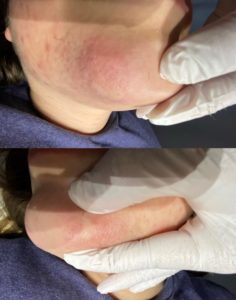It’s Electrolysis After Laser Treatment Failed
The client is pleased with the changes after turning to electrolysis after laser treatment failed to eliminate unwanted facial hair. The marked difference is a relief. She loves the feel and the look of her skin.
For individuals who have red hair and suffer from polycystic ovary syndrome, also known as PCOS, medical experts say electrolysis is the best treatment to permanently remove unwanted body hair.
Red hair clients with PCOS get the best results from electrolysis

Changes on the chin after electrolysis treatment
Alpha Electrolysis, a permanent hair removal clinic in Connecticut, recommends electrolysis for individuals with red hair who suffer from PCOS. Individuals should make sure they discuss with their electrologist what form of treatment works best for them. That discussion should include hair color skin tone and any health conditions such as PCOS.
Studies show that individuals with red hair tend not to see the desired results from laser treatments. And when you add PCOS to the mix, the problem is compounded. Laser treatment works best for fair skin individuals with black hair. But again, laser treatments do not permanently remove hair removal.
At Alpha Electrolysis, we make sure to work with clients so they get the best electrolysis after laser treatments fail.
What is Polycystic Ovary Syndrome?
While we know that red hair is a genetic trait, not everyone knows a lot about PCOS. Polycystic ovary syndrome affects the hormone levels of women between 15 and 44 years, which spans the years when women tend to have children.
According to Healthline, between 2.2 and 26.7 percent of women in this age group have PCOS. Because of this condition, these women generate above-normal amounts of male hormones, which leads to an imbalance. This hormone imbalance forces their bodies to bypass menstrual cycles, making it harder for them to get pregnant.
The signs and symptoms of PCOS tend to show up during puberty. That is when the first menstrual period appears, according to the Mayo Clinic. The syndrome, however, can develop later in response to a substantial increase in body weight.
PCOS and extra hair growth
More than 70 percent of women with PCOS experience hair growing on their faces. Some women contend with hair growth on their backs, chest, and belly, according to Healthline. This excessive hair growth is called hirsutism.
Also, male hormones can lead to women having oilier skin. Oily skin can result in breakouts or acne on the face, chest, and upper back.
If you have PCOS, the medical experts say, individuals can also suffer from male pattern baldness. Some women might even see the hair on the scalp get thinner or fall out. Also, some may see dark patches on different parts of their bodies, including the neck, under the breasts, and groin.
Other long-term health issues also affect women who suffer from PCOS. Among them are:
- Diabetes
- Heart disease
Causes of PCOS
Doctors apparently can’t point to the exact causes of PCOS, the Mayo Clinic says. However, the non-profit organization offers some possibilities. They include high levels of male hormones that prevent the ovaries from producing hormones and making eggs in a normal process.
The Mayo Clinic says that genes, insulin resistance, and inflammation connect excess androgen production in women with the syndrome.
The issue of PCOS is has been around for a very long time. Italian physician Antonio Vallisneri was the first to describe symptoms of the syndrome in 1721, Healthline says.
Take action to permanently remove unwanted hair
So, what should you do if you have unwanted body hair caused by PCOS?
The first step is to talk to your doctor and get medical recommendations about treating the syndrome.
If you have a combination of red hair and PCOS and need unwanted hair removed, you should opt for electrolysis when laser treatment failed. But make sure you discuss with an electrologist with knowledge about how to treat individuals with red hair and PCOS.
Alpha Electrolysis, based in Wallingford, CT, offers free consultations before taking on any clients. The clinic also serves clients in Cheshire, Branford, Durham, New Haven, North Haven, Cromwell, Rocky Hill. Berlin, Southington, and West Hartford.
#lasertreatment #electrolysissersuslaser #bestelectrolysistreatment #polycysticovarysyndrome #redhairandPCOS

